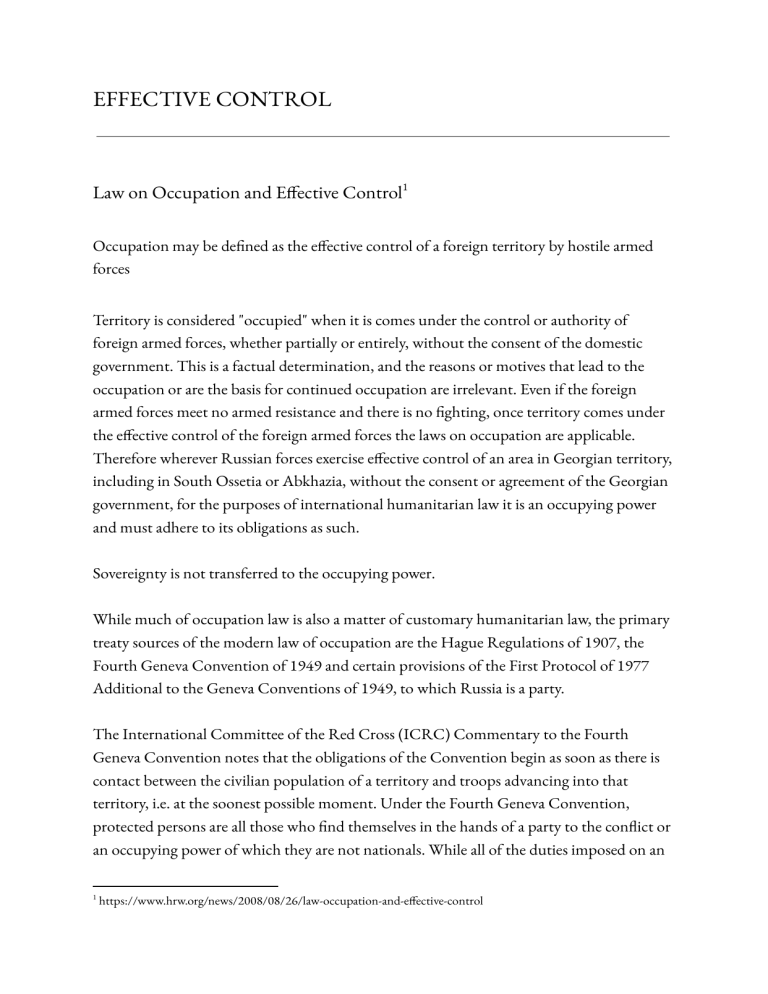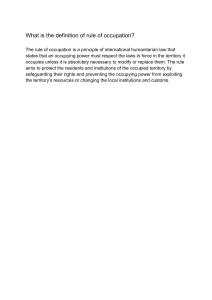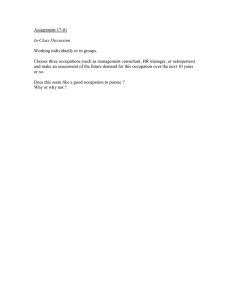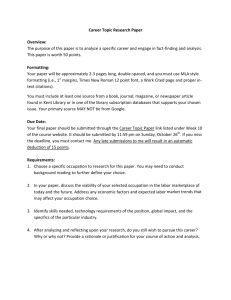
EFFECTIVE CONTROL Law on Occupation and Effective Control1 Occupation may be defined as the effective control of a foreign territory by hostile armed forces Territory is considered "occupied" when it is comes under the control or authority of foreign armed forces, whether partially or entirely, without the consent of the domestic government. This is a factual determination, and the reasons or motives that lead to the occupation or are the basis for continued occupation are irrelevant. Even if the foreign armed forces meet no armed resistance and there is no fighting, once territory comes under the effective control of the foreign armed forces the laws on occupation are applicable. Therefore wherever Russian forces exercise effective control of an area in Georgian territory, including in South Ossetia or Abkhazia, without the consent or agreement of the Georgian government, for the purposes of international humanitarian law it is an occupying power and must adhere to its obligations as such. Sovereignty is not transferred to the occupying power. While much of occupation law is also a matter of customary humanitarian law, the primary treaty sources of the modern law of occupation are the Hague Regulations of 1907, the Fourth Geneva Convention of 1949 and certain provisions of the First Protocol of 1977 Additional to the Geneva Conventions of 1949, to which Russia is a party. The International Committee of the Red Cross (ICRC) Commentary to the Fourth Geneva Convention notes that the obligations of the Convention begin as soon as there is contact between the civilian population of a territory and troops advancing into that territory, i.e. at the soonest possible moment. Under the Fourth Geneva Convention, protected persons are all those who find themselves in the hands of a party to the conflict or an occupying power of which they are not nationals. While all of the duties imposed on an 1 https://www.hrw.org/news/2008/08/26/law-occupation-and-effective-control occupying power may not become applicable immediately (some presuppose the presence of the occupation authorities for a fairly long period), the entirety of the provisions relating to the rights enjoyed by protected persons and their treatment become applicable immediately. International humanitarian law provides that once an occupying power has assumed authority over a territory, it is obliged to restore and maintain, as far as possible, public order and safety (Hague, art. 43). Under the Fourth Geneva Convention, the occupying power must also respect the fundamental human rights of the territory's inhabitants, including noncitizens (Geneva IV, arts. 29, 47) and ensure sufficient hygiene and public health standards, as well as the provision of food and medical care to the population under occupation (G IV, arts. 55,56). Collective punishment and reprisals are prohibited (Protocol I, 75). Personnel of the International Red Cross/Red Crescent Movement must be allowed to carry out their humanitarian activities (G IV, art. 63). An occupying power is specifically prohibited from carrying out reprisals and collective penalties against persons or their property (G IV, art. 33) and from taking hostages (G IV, art. 34). In general, no one can be punished for acts for which he or she has not personally committed. All parties to a conflict are required to provide information on prisoners of war (G III, art. 122) and "protected persons" (civilian nationals) in their custody (G IV, art. 136). The occupying power is prohibited from forcibly transferring or deporting protected persons outside of the occupied territory irrespective of motive (G IV, art. 49). ICRC view https://www.justsecurity.org/wp-content/uploads/2015/11/2015-ICRC-Report-IHL-and-Challenges-of-Armed-Con flicts.pdf In principle, the effective-control test is equally applicable when establishing the end of occupation, meaning that the criteria to be met should generally mirror those used to determine the beginning of occupation, only in reverse. Thus, if any of the three conditions listed above ceases to exist, an occupation should be considered to have ended. The ICRC considers, however, that in some specific and rather exceptional cases – in particular when foreign forces withdraw from occupied territory (or parts thereof) but retain key elements of authority or other important governmental functions usually performed by an occupying power – the law of occupation may continue to apply within the territorial and functional limits of such competences. Indeed, despite the lack of the physical presence of foreign forces in the territory concerned, the retained authority may amount to effective control for the purposes of the law of occupation and entail the continued application of the relevant provisions of this body of norms. This is referred to as the “functional approach” to the application of occupation law. This test will apply to the extent that the foreign forces still exercise, within all or part of the territory, governmental functions acquired when the occupation was undoubtedly established and ongoing. The functional approach described above permits a more precise delineation of the legal framework applicable to situations in which it is difficult to determine, with certainty, whether an occupation has ended or not. It may be argued that technological and military developments have made it possible to assert effective control over a foreign territory (or parts thereof) without a continuous foreign military presence in the concerned area. In such situations, it is important to take into account the extent of authority retained by the foreign forces rather than to focus exclusively on the means by which it is actually exercised. It should also be recognized that, in these circumstances, the geographical contiguity between belligerent States could facilitate the remote exercise of effective control. For instance, it may permit an occupying power that has relocated its troops outside the territory to reassert its full authority in a reasonably short period of time. The continued application of the relevant provisions of the law of occupation is all the more important in this scenario as these were specifically designed to regulate the sharing of authority – and the resulting assignment of responsibilities – between the belligerent States concerned. CASES ICJ case: Military and Paramilitary Activities in and against Nicaragua (Nicaragua v. United States of America) https://www.icj-cij.org/en/case/70/judgments US did not pass effective control test Ruling Quotes: 27th June 1986 paras 105-115 In the light of the evidence and material available to it, the Court is not satisfied that al1 the operations launched by the contra force, at every stage of the conflict, reflected strategy and tactics wholly devised by the United States despite the secrecy which surrounded it, at least initially, the financial support given by the Government of the United States to the military and paramilitary activities of the contras in Nicaragua is a fully established fact. Despite the large quantity of documentary evidence and testimony which it has examined, the Court has not been able to satisfy itself that the respondent State "created" the contra force in Nicaragua. Nor does the evidence warrant a finding that the United States gave "direct and critical combat support", at least if that form of words is taken to mean that this support was tantamount to direct intervention by the United States combat forces, or that al1 contra operations reflected strategy and tactics wholly devised by the United States. On the other hand, the Court holds it established that the United States authorities largely financed, trained, equipped, armed and organized the FDN. In sum, the evidence available to the Court indicates that the various forms of assistance provided to the contras by the United States have been crucial to the pursuit of their activities, but is insufficient to demonstrate their complete dependence on United States aid However, whether the United States Government at any stage devised the strategy and directed the tactics of the contras depends on the extent to which the United States made use of the potential for control inherent in that dependence. The Court already indicated that it has insufficient evidence to reach a finding on this point. It is afortiori unable to determine that the contra force may be equated for legal purposes with the forces of the United States. This conclusion, however, does not of course suffice to resolve the entire question of the responsibility incurred by the United States through its assistance to the contras. Interpretation https://academic.oup.com/ejil/article/18/4/649/453762#6810449 In Nicaragua the Court distinguished between two classes of individuals not having the status of de jure organs of a state but nevertheless acting on behalf of that state: (1) those totally dependent on the foreign state – paid, equipped, generally supported by, and operating according to the ‘planning and direction’ of organs of that state (these were the UCLAS in that case)6; (2) persons who, although paid, financed and equipped by a foreign state, nonetheless retained a degree of independence of that state (these were the Nicaraguan rebels, or contras).7 The Court stated that acts performed by the first class of persons were to be clearly attributed to a foreign state (the US). As for acts of the contras, the Court took a certain position when discussing acts of such rebels involving a violation of the obligations not to intervene in the internal affairs of other states and to refrain from the use of force, whereas it took a different stand with regard to acts performed by contras in breach of rules of international humanitarian law. The Court had then to consider whether some actions by contras in breach of international humanitarian law (killing of prisoners, indiscriminate killing of civilians, torture, rape and kidnapping)9 could be attributed to the US. It answered this question in the negative. It required for such attribution a very exacting test, namely that of ‘effective control’ by the US over contras’ actions in breach of international humanitarian law, a test the Court held had not been met in the case at bar. By such ‘effective control’, the Court meant that the US should have ‘directed or enforced the perpetration of the acts contrary to human rights and humanitarian law alleged by the applicant State’ (para. 115; emphasis added). It seems clear from these words that by ‘effective control’ the Court intended either (1) the issuance of directions to the contras by the US concerning specific operations (indiscriminate killing of civilians, etc.), that is to say, the ordering of those operations by the US, or (2) the enforcement by the US of each specific operation of the contras, namely forcefully making the rebels carry out those specific operations. ICJ case: Genocide in Bosnia Bosnian Serb armed forces (VRS) had perpetrated genocide in Srebrenica Court explored question: “whether, as claimed by Bosnia, those armed forces had in reality acted on behalf of the Federal Republic of Yugoslavia (FRY), in which case responsibility for genocide would have to be attributed to that state”2 Perpetrators of the Srebrenica genocide, were not de jure organs of the FRY, nor could they be equated with such organs on account of possible ‘complete dependence’ on the FRY Court uses ‘effective control’ test enunciated in Nicaragua “In the opinion of the Court, this test substantially coincided with the standards required by the International Law Commission (ILC) in Article 8 of the ILC Articles on State Responsibility which, according to the Court (para. 398), reflects customary international law. As is well known, that article attributes to a state conduct by persons or groups of persons acting ‘on the instructions’, or ‘under the direction’ or ‘under the control’ of the state” It declared that the test used in case of Tadic* was an unsatisfactory control test/ The effective control principle was not attributed to Serbia. * 2 Casses, Antonino, The Nicaragua and Tadić Tests Revisited in Light of the ICJ Judgment on Genocide in Bosnia https://academic.oup.com/ejil/article/18/4/649/453762




